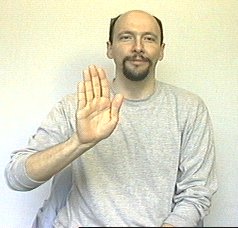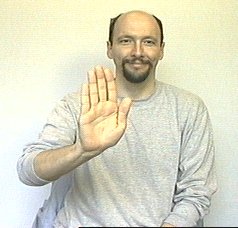American Sign Language: Possession
In American Sign Language, personal pronouns (me, she/he, you, us, them) can indicate possession by changing the handshape from an index finger to a flat hand (a version of a "b" palm).
The palm should face toward the person or thing that is doing the possessing.For example, the sign for "you" when done with a "b" palm, fingertips up, palm toward the person, means "your."
Other examples:General possession can be indicated by signing the word "have." To do this, place the fingertips of both "b" palms on your chest. Your hands should be bent at the knuckles with the fingers straight.
- mine: "b" palm on chest
- his: "b" palm toward the person
- hers "b" palm toward the person
- theirs "b" palm makes sweeping motion indicating whom is being referred to

Another way to indicate possession is the order in which you sign something. For example, if you sign: "my mother dog dead," the order of the signing ("dog" immediately after "mother") would establish that the dog belonged to your mother.
<< Question: Can I use the "S" for possession in ASL? Like in "Sara's daughter.">>Response: In general I do not use the possessive "S" to establish possession in ASL. For those of you who have never seen a possessive "S" -- it is done by adding a slight inward twist to an "S-hand." Think of someone holding onto a stick of beef jerky and then twisting their hand as they bite off a piece to chew on. (No, the possessive "S" isn't done near the mouth, it is done in the general signing/fingerspelling space. But the motion is similar to the twisting motion a person uses to bite a bit of beef jerky.) The possessive "S" is used quite commonly in Contact Signing (PSE) and or SEE, but not as often in ASL.
Just about the only time I use a possessive "S" in ASL is when I'm fingerspelling a title. For example, suppose someone asks me what is the name of that delicious pizza place we went to the other night, I might respond by fingerspelling "A-N-T-O-N-I-O'S," using a possessive "S" at the end of Antonio's.
In ASL, to sign "Sara's daughter," I'd spell "S-A-R-A" and then sign "DAUGHTER." The order of the words would indicate the relationship. If I needed to be absolutely clear, I'd sign, "S-A-R-A, HER-[aiming the possessive B-palm toward Sara or the referent-area for Sara] DAUGHTER."
have / possess
HIS, HER, and ITS can all be indicated by the same sign:
my / mine / belongs to me
our / ours
their / theirs / belonging to multiple individuals
your / yours / belongs to you















